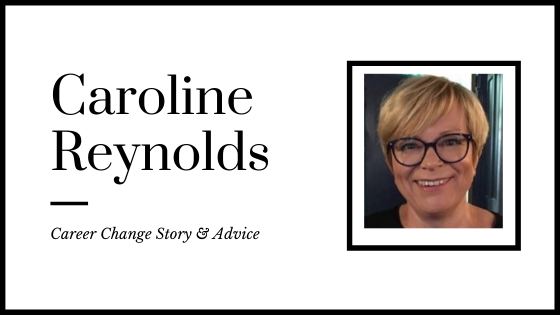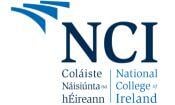
NCI Careers Advisor, Jennifer Kwan, spoke to recent graduate Caroline Reynolds about her experience changing careers as part of our Career Tips Blog Series.
The pandemic has changed the way we work and the way we think about our jobs and our careers, but are we adapting our attitudes in the long run in the right way? Career changers have been leaders in anchoring their career decisions on learning and are finding more opportunities open to them because of it. They have recognised that their values and motivations have changed over the years and that becoming more flexible, self-reliant, and above all, better at learning, will prepare them for success.
Career changers have the skills, experience and personality traits to make them some of the most employable professionals on the market today. I spoke to alumni Caroline Reynolds about her experience transitioning from Retail Management to HR.
Caroline’s Story
Caroline had a traditional career in retail starting from when she finished school. She received consistent promotions throughout her career and moved up through bigger companies for senior management roles. Her growth and development came from company exposure and training as a people manager, but she recognised that she needed to broaden her opportunities if she wanted to stay engaged in her career.
After doing some personal reflection and research, she chose to pursue a career in HR by taking some part-time courses and working on selling her considerable transferrable people skills. Through her network, she secured a role as an HR Manager where her retail and sales experience are critical requirements to the role.
Preparing for a Career Change
Before signing up for a new part-time course, it's worth taking a step back and investigating whether this is a good move for you. Caroline shares these four simple steps to plan for a career change:
1. Get clarity with yourself: You need to be clear about what outcome you would like for the next stage in your career, your motivations, and your values. Address any self-doubt that you have about your age and ability to learn and move into a new role. Your self-efficacy is often a driver of your outcome expectations so Caroline took a short online course first to prove to herself that she could complete the academic assignments.
2. Use your network: Caroline sought out advice and feedback from the people who know her best and who would both challenge and support her journey. She spoke to people who had previous positive influences on her career and life decision-making to hash out the pros and cons.
3. Research the opportunities: Do your research about career progressions, courses, and the employment market in the sector you want to get into. Attend the open evenings either online or in the college to get a sense of the learning environment and the staff supporting you. Check in with people in your network to get a feel for the market to understand where you can add value.
4. Test the waters: Build your confidence academically and test the reality of a career change with a short online course. Caroline took a 10-week online course in counselling to start with. She gained confidence in her academic abilities but realised that the counselling route was too long a journey for her. She re-investigated the idea of HR and signed up for the HR Certificate at NCI and finished with a CIPD Diploma in HRM.
Advertising Your Transferrable Skills
As a career changer, you have a wide range of transferable skills with deep strengths and proven capabilities. You have learned to develop your strengths, now it is time to advertise them.
1. Niche skills: Caroline moved from retail management to HR, but her in-depth knowledge of retail practices meant that she was a stand-out candidate for a HR role for a large retailer.
2. People strengths: Caroline identified that she had extensive experience balancing the priorities of colleagues, clients, suppliers, and stakeholders. She could lead the communications of complex ideas and information and collaborate with people on projects. She also had deep and proven techniques for problem-solving and adding value to her clients and to the business. Going into college projects, she practiced a new skill of facilitation and mediation in group projects rather than her natural inclination to act as team lead.
3. Professional strengths: Caroline also identified professional strengths with proven experience in planning, managing projects, and thinking strategically. These will be tested again in your degree, but they are strengths that you can bring to any new role.
Read: Top Tips for Succeeding at Job Interviews from a Careers Expert
Advice for Returning to Study
1. Build on your strengths: Caroline used her natural strengths in organising, problem-solving, and strategies to balance work alongside her studies, increasing her self-efficacy as a learner and as a professional. Her successful performance in the HR Certificate increased her outcome expectations and boosted her motivation to become a HR professional.
2. Participate: Caroline got the most out of her experience by asking questions, contributing, and listening to her classmates. She also engaged with the college services for academic and career support.
3. Adopt a growth mindset: Caroline chose to take new roles in her group work and was able learn new theories with the confidence that she would learn to implement them when she moved into HR. She is incredibly proud of achieving her degree because it proves that no matter what age you are you can always return to learning and find a way to add value to the world.
Advice for Securing Employment
1. Network: Use your extensive network that you have built credibility with over the years. Caroline secured her role through a contact that was familiar with her career and confident in her ability to transition to HR.
2. Prepare: Focus on your academics and getting your application materials ready early. The CV and LinkedIn profile are very important for networking and to advertise what you have to offer. Get feedback from professionals you know through your own network. Caroline worked on her application materials over time, adjusting them as she gained more knowledge about the market and better identified her transferrable skills.
3. Be flexible: Prepare for the first role to be a stepping stone in your career. As Caroline put it so well, the career change into her first HR role has given her more options than remaining in retail ever could. She has scope and opportunity to progress into senior roles and has the opportunity when the time is right to step back into a role that she will love until the end of her career.
Career changers can be the most valuable employees in the market if they are prepared, open to opportunities, and know how you use their strengths to their advantage. Our worldview of education being only for the 20 somethings needs to change because learning should be a lifelong activity that empowers people to help make the best decisions for them at any stage of their lives.
Career changers can offer employers unique and deep experiences and skillsets, but most importantly they offer a growth mindset, willingness to learn, and resilience and curiosity.










